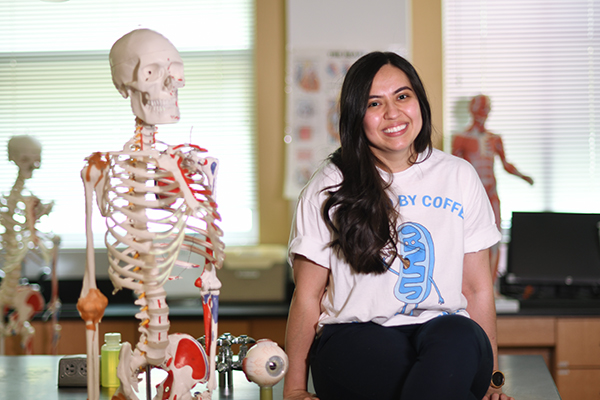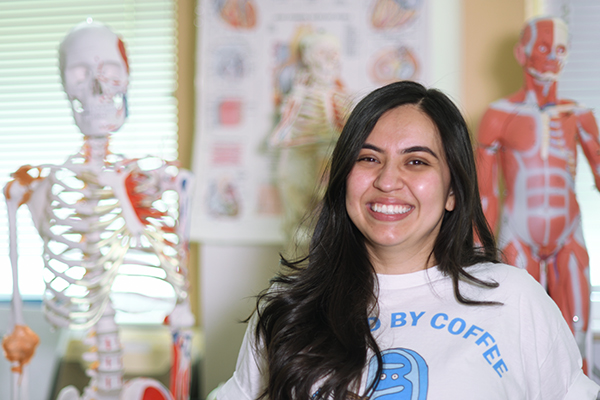News
‘Dalton State has given me an identity’
05/12/21
 Carolina Hernandez recognizes how different her life would have turned out had she stayed in Guanajuato, Mexico instead of emigrating to the United States as a young child.
Carolina Hernandez recognizes how different her life would have turned out had she stayed in Guanajuato, Mexico instead of emigrating to the United States as a young child.
Teen girls there often marry and have children instead of finishing even their high school education, so college isn’t an option, Hernandez said.
“I am thankful that isn’t my life,” she said. “I know of the struggles my mom went through, and I didn’t have to. My mom was one of the smartest in her class, but she couldn’t pursue her education. That’s why education is so important to her, and I’m thankful for everything she’s done for me. I am so blessed, and I am so thankful my parents emigrated.”
That decision has allowed Hernandez to pursue her own dreams. She will soon graduate from Dalton State with a bachelor’s in biology. The years she has spent as a student have allowed her to experience hands-on learning through undergraduate research and using specialized equipment.
Hernandez’s love for biology began when she was a student at Southeast Whitfield High School, where she graduated in 2014. It only grew thanks to her time as a Roadrunner.
“The most fun I’ve had as a student, and the times I feel like I’ve learned the most were when I had hands-on experiences,” she said. “My favorite class was microbiology. And I’ve also loved working with the scanning electron microscope, which magnifies so much and so clearly you can see every detail on the wings of a fly. It’s a whole new world.”
.jpg) Hernandez worked directly with Dr. Hussein Mohamed, associate professor of biology, on plant research. Their research involves changing an alfalfa plant’s ability to resist salinity at the molecular level.
Hernandez worked directly with Dr. Hussein Mohamed, associate professor of biology, on plant research. Their research involves changing an alfalfa plant’s ability to resist salinity at the molecular level.
“Carolina is using tissue culture techniques to develop salinity and drought-resistant variant cell lines of economically important plants and the stability of stress resistance in regenerated plants,” Mohamed said. “Carolina shows very impressive skills in experimental execution and data collection and analysis. Carolina is one of the top research students I have supervised over the last couple of years. She is responsible and seeks academic quality, as well as an intellectual challenge.”
Hernandez plans to continue her research after graduation. She is learning, not only how to use lab equipment and techniques, but also how to write grant and research proposals.
“This opportunity has meant so much,” she said. “I am learning so much in the lab. The knowledge I’m gaining may help me in my future career. I know how to use this equipment and how to design research and experiments. We are changing the plants at the molecular level, and it’s amazing. Evolution is amazing. Dr. Mohamed teaches so much, and he’s such a great professor.”
There were times Hernandez wasn’t sure she would finish her degree. She officially graduates this week, but commencement ceremonies are postponed to July due to the global pandemic.
“After almost six years, I finally did it,” she said through tears. “It feels great.”
Hernandez is a recipient of Deferred Action for Childhood Arrivals (DACA).
“When I graduated high school, I wanted to be a teacher,” she said. “Unfortunately, DACA recipients could not work as teachers at that time. So, I was hesitant to attend college, especially since DACA students pay out-of-state tuition. My parents said they came all this way and so I would attend college. My whole family helped me pay for the out-of-state tuition.”
Hernandez and her family, including her siblings, worked to earn money to help her cover tuition and other costs associated with college. Some years she could only take a couple of classes at a time. But the last couple of years, Hernandez was able to attend Dalton State full time. If she wasn’t in class, she was at work.
“Because of my family, I am here,” she said. “I remember in elementary and middle school not having access to health insurance or healthcare. When I got sick, we had to find a doctor who would treat me without insurance. Thanks to DACA that changed, and I can have insurance and a driver’s license and a college education. Now, I have an identity.”
DACA recipients do not have a pathway to citizenship, and they have to renew their status every two years.
 “The only way I can achieve legal status is to get married or if the government changes its policy and provides me a pathway,” Hernandez said. “It is scary. My status is why I wanted to be sure I could attend college full time and hurry and finish my education. If anything happens, at least I have my education now. No one can take that from me.”
“The only way I can achieve legal status is to get married or if the government changes its policy and provides me a pathway,” Hernandez said. “It is scary. My status is why I wanted to be sure I could attend college full time and hurry and finish my education. If anything happens, at least I have my education now. No one can take that from me.”
Dr. Kim Hays, associate professor of biology, wishes all her students approached learning similarly to Hernandez.
“Carolina is the kind of student I wish I could have in every class,” Hays said. “Not just because she is brilliant, because she is, but Carolina approaches every class, every interaction and every day with a sense of gratitude and joy I wish I could harness. Her road to completing her degree has not been like most of her classmates. It has been a difficult, time-consuming, uncertain and expensive road. Carolina never knew if that road would end in a degree or a career due to her DACA status. Nevertheless, she always brings gratitude for the moment with her. She truly embraced her time at Dalton State, not just to finish her degree, but to build lifelong skills and relationships that will carry her on whatever path she desires.”
Hernandez asked Hays in November if she had voted. It wasn’t important to her who Hays had voted for, just that she had exercised that right.
“She was adamant that I had to make sure my vote was cast in the election,” Hays said. “I assured her I had voted early and realized she was asking this question of everyone she encountered. When I asked her why she was so enthusiastic she told me ‘I need people to vote because there are those of us who can’t.’ Carolina is the American dream.”
Hernandez realizes DACA is a divisive topic.
“I associate myself with this culture more than my Mexican culture, though it is very important to me as well,” Hernandez said. “I love this country, but I know the love I feel for this country is not always reciprocated.
“Dalton State has given me my future,” she said. “It has given me an education. I wouldn’t have this education in Mexico. Dalton State has given me an identity. It has given me everything I need to find a job, be independent and follow my dreams.”
